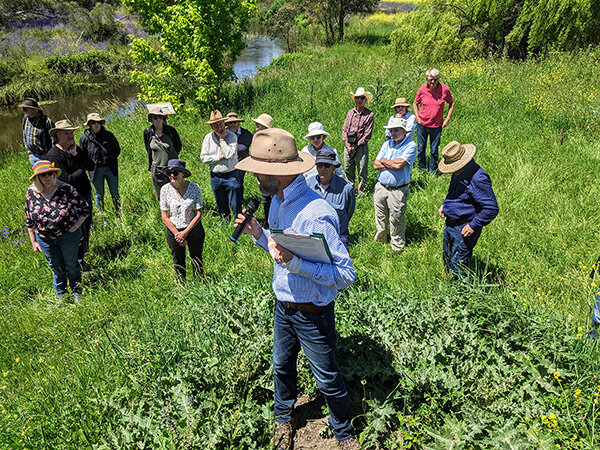Research Coordinator Luke Peel and Science Officer James Diack from the Mulloon Institute hosted members and friends of the Wollondilly CWA Group on the Southern Highlands, which extends from Ulladulla to Kiama, and from Bundanoon to Mittagong.
The day began with a COVID-safe morning tea in the Barn prepared by the CWA ladies (thanks Bec Hogan, Pat Hughes and Aliki Darlow!) , followed by a brief presentation and then relocating to the field tour at Peter’s Pond.
The group were keen to see how leaky weirs have regenerated the system to maintain water levels and flow of the creek. This work has enabled more and diverse riparian and aquatic vegetation to flourish, creating habitat and food for local fauna, reduce evaporation, and filter and oxygenate the water.
In the shade at Peter’s Pond.
Discussion highlighted how the creek and adjacent floodplains interact, particularly following the recent flood in August where a large amount of silt and organic matter was deposited and the floodplain soils were fully recharged. The group heard how this floodplain rehydration will significantly boost the regeneration of the soils and pasture productivity, plus provide groundwater recharge that will continue to keep the creek topped up.
The group were very interested, with a wide range of questions about; the rehydration works, how to work with nature to increase production, land management techniques, soil management including the importance of microbes. A big question was around how to manage weeds. Participants learnt that these pioneer plants (weeds) actually provide a feedback loop that suggests that ‘this ground under repair’. The weeds are in fact helping to manage whatever factor is causing the plants to be present, such as compaction, bare ground, overgrazing, etc. Once the weeds have done their repair work, the land is then able to transition to a more preferred plant species composition.
Discussing the role of weeds.
The next site the group visited was the Step Diffusion site situated on sloping country, which demonstrates how an eroding gully system can be rehydrated and regenerated to increase productivity and environmental outcomes. This site has been transformed by placing leaky contours at strategic locations based on reading the landscape, to slow the flow of water, spread the water laterally to infiltrate and rehydrate the whole system downslope. Too much surface water runoff can cause erosion, loss of infrastructure, plus loss of nutrients and organic material. Water that has infiltrated into the soil moves more slowly downslope through gravity, and promotes plant growth and soil microbe activity. The water does eventually make it to the series of farm dams below, and when it arrives it is filtered clean and provides quality water for use without adding sediment to the dam. Now that their habitat has been regenerated, frogs and birds have quickly moved back into the area, and more diversity of plants have emerged.
Lunch was held in the Barn while two of TMI’s educational and inspirational videos were screened, followed by a presentation by Luke Peel covering many aspects of the Institute’s work on the catchment-scale Mulloon Rehydration Initiative. This was followed by Question and Answer session with many excellent questions and with James and Luke providing examples and knowledge for them to consider.
Presentation in the Barn.
Hopefully participants are now further inspired to consider implementing some of the practical steps towards rehydrating and regenerating on their own properties, which will help build resilience for future climate extremes, even if they only start on a small scale.
A big thanks to Bec Hogan who organised the group tour and for her patience with the original event being postponed twice due to bushfires and then COVID restrictions.
To thank the group for trying for the third time to attend, four boxes of super jumbo eggs (480 eggs in total) from TMI’s certified organic, biodynamic, pasture-raised, free-range eggs from Mulloon Creek Natural Farms were offered as a gift, and all eggs were happily shared amongst the group.
The Mulloon Rehydration Initiative is jointly funded through the Mulloon Institute and the Australian Government’s National Landcare Program. The initiative is also assisted by the NSW Government through its Environmental Trust.


